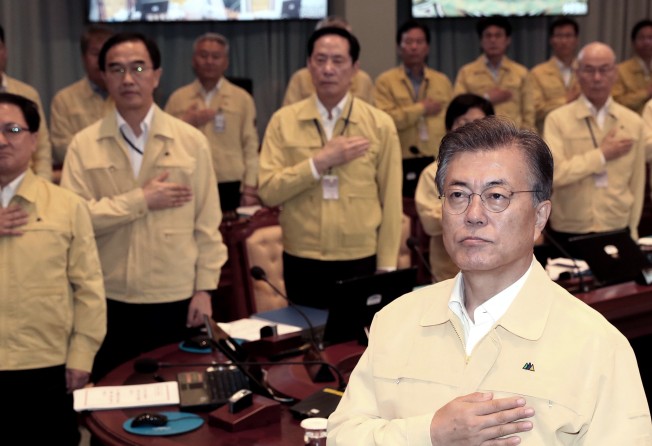With Samsung heir in jail, South Korea’s Moon Jae-in shows he means business on chaebol
William Pesek says rogue tycoon monopolies are the bigger threat to South Korea than nuclear-armed Kim Jong-un next door, and the conviction of Lee Jae-yong could well be Moon’s rallying cry

Lee Jae-yong doesn’t cut the sinister figure Kim Jong-un does. The often smiling, soft-spoken Samsung heir offers a radical contrast to the bombastic, nuclear-armed North Korean despot.
But in putting Lee in prison for five years, Seoul may have vanquished the bigger threat of the two to its economy.
Starting with Kim’s grandfather, Kim Il-sung, moving on to his father, Kim Jong-il, all the way to the 30-something Kim Jong-un, Pyongyang has long pushed the envelope.
No one is happy about the North’s missile tests and bluster, the latest example coming on Tuesday, but South Koreans long ago learnt to go on with their lives. All that’s really changed is that the current US president isn’t wise enough not to take the bait.
As newish South Korean leader Moon Jae-in works to increase growth, incomes and competitiveness, the real brinkmanship is with the family-owned conglomerates that Samsung represents.
Samsung heir and vice chair found guilty of bribing former president
For decades now, the so-called chaebol used political connections to build monopolies that give them near-absolute power over Asia’s fourth-largest economy. With tentacles around virtually every industry, they starve small to midsize enterprises of the economic oxygen needed to create new jobs and wealth.
Moon’s predecessor, Park Geun-hye, assumed office in February 2013 pledging to “democratise” the economy. Her plan to build a more “creative” growth model aimed to use regulatory changes, tax incentives and government training programmes to take power way from the Samsungs, Hyundais, LGs, Daewoos and SKs of the nation. For many reformists, she seemed a perfect bookend, considering Park’s father, dictator Park Chung-hee, championed the chaebol system in the 1960s and 1970s.
Instead, Park got co-opted. As economic growth slowed, she asked chaebol bosses to boost national investment and demand. That created a quid pro quo: help me now, and Seoul would tolerate your monopolistic behaviour. Then Park went further, shaking down the chaebol, through an emissary, for about US$70 million. Lee’s conviction for bribery and perjury was for his role in Park’s downfall.
Park Geun-hye charged with accepting bribes, abuse of power and coercion
Enter Moon, a far more liberal leader than Park, and a disciple of Roh Moo-hyun, a labour rights activist turned president who served from 2003 to 2008. Moon talked tough on the campaign trail about using antitrust measures to take the chaebol down a peg, and Lee’s conviction could be his rallying cry.
First, Moon must resist the urge to pardon Lee, a scenario that has played out time and time again in recent decades. Lee’s father, the currently hospitalised Lee Kun-hee, was absolved of bribery charges in 2009 and back at the Samsung wheel soon after. The all-to-common Seoul two-step emboldens rogue tycoons to act with impunity, generation after generation.
Jay Y. Lee is no scapegoat, try as Korean conservatives may to colour him as such. He personifies the glass ceiling of sorts that stands between most of Korea’s 50 million people, and higher wages and greater career choices.
Samsung, which alone generates between 20 per cent and 25 per cent of Korea’s GDP, is Exhibit A. The chaebol attract the best talent, have the readiest access to markets and new technologies, and can absorb any scrappy start-up that someday might pose a threat.
Add in a dozen other giants, and Korea is too top-heavy. It’s too much about job protection at the top of the economic food chain, not job creation from the bottom up. That stymies innovation, productivity and competitiveness.
The chaebol’s excesses, meanwhile, are legion. Their excessive borrowing and overexpansion explain why Korea toppled so quickly in 1997 amid the Asian financial crisis. Seoul has been pledging to curb their dominance ever since – with little success.
Second, Moon needs to get radical with these behemoths. In a promising sign he may be doing just that, Seoul’s new antitrust chief said last week he is scrutinising Hyundai for its opaque and complex ownership structure.
20 years into Seoul’s battle with the chaebol, South Koreans may have elected the ideal leader
A harbinger of bolder action to come? Only time will tell. Moon should harness the groundswell of public anger over Lee’s exploits to announce a sweeping crackdown.
Moon should set his anti-monopoly attack dogs on cosy ties between government and executives, limit any one company’s control over an industry, dissect cross-shareholdings between friendly firms, tax chaebol sitting on trillions of dollars of cash they could use to fatten paychecks, diversify boardrooms by adding more women and foreigners, implement a more international code of conduct with real teeth, support start-ups, and tweak the education system to inspire greater risk-taking.
Granted, Kim’s antics up North are quite the distraction for Moon’s 16-week-old presidency. So are US President Donald Trump’s threats of war, both in trade and against the Kim dynasty.
But 20 years into Seoul’s battle with the chaebol, South Koreans may have elected the ideal leader at a fortuitous moment to turn their economic system upside down. Letting Lee’s conviction stand and taking on his peers will demonstrate the nation means business.
William Pesek is a Tokyo-based journalist and the author of Japanization: What the World Can Learn from Japan’s Lost Decades. Twitter: @williampesek